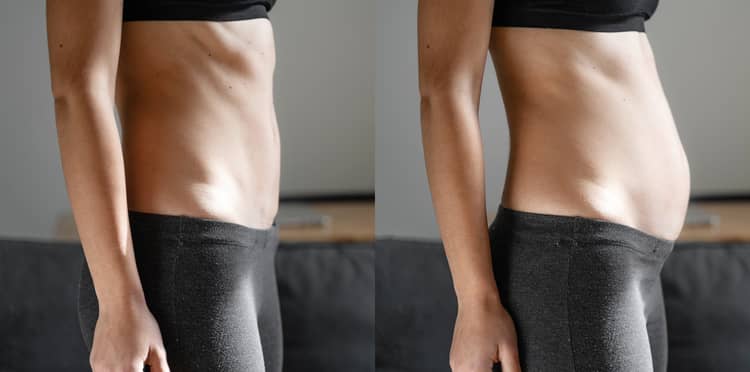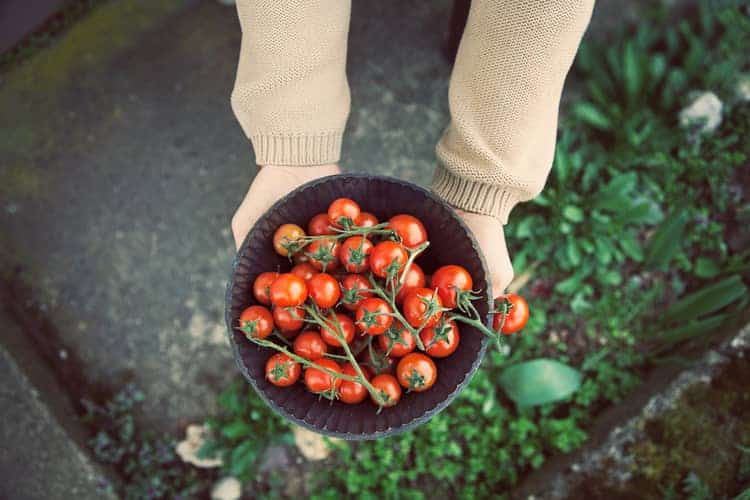
You’ve decided to eat healthy and you’re loading up on vegetables. But now you’re experiencing more bloating, gas and what not. So much for “healthy”, right? Well, before you throw up your hands in frustration, check out the tips below on how to reduce bloating from vegetables.
You don’t have to implement all of them. Just start with one or two that make the most sense for you and your lifestyle.
As you implement these tips, pay close attention to how your body looks and feels.
The hardest part with reducing bloating is finding the right approach that will work for your particular body.
Once you’ve got it nailed down, you can usually start getting some relief within a day or two (at least based on my own personal experiences!).
Note: this post contains affiliate links and I earn a commission (at no additional cost to you) if you use them to make a purchase.
HOW TO PREVENT BLOATING AND GAS FROM EATING VEGETABLES

1. Use water-rich veggies for salads and other raw meals
Even though we retain water when we’re bloating, not consuming enough water can also contribute to bloating (and constipation).
So, when making a salad or other raw meals, focus on water-rich veggies.
Many water-rich veggies tend to have smaller amounts of the problematic fibers that trigger bloating.
At the same time, the extra water from these veggies will help to keep you hydrated and regular.
The veggies with a high water content that you can add to your diet include (source):
- All types of lettuce.
- Cucumber.
- Celery.
- Tomatoes.
- Bell peppers.
- Portobello mushrooms.
- Spinach
2. Slowly increase consumption of cruciferous veggies
Amongst vegetables, cruciferous veggies are notorious for contributing to bloating and gas.
This stems from the fact that cruciferous vegetables have high amounts of an indigestible sugar called raffinose.
In the gut, there are bacteria that feed on this raffinose.
The end result? Side effects like bloating or gas.
One way to potentially minimize these side effects is to take your body through a training phase.
This simply means that you slowly and gently increase how much cruciferous vegetables you eat.
This gives your gut time to adapt and progressively build up the bacteria that are necessary to break down these veggies.
3. Add prebiotic-rich foods to your diet
Prebiotics are a type of soluble fiber found in certain foods. These prebiotic fibers are unique because they:
- go through the GI tract undigested.
- encourage the growth of good bacteria, while in other cases, they stimulate the activity of good bacteria in the large intestines.
Because of their effect on gut bacteria, prebiotics can make it easier to break down food and subsequently, ease bloating.
Some of the main types of prebiotics that are found in our food supply include fructans, inulin and galacto-oligosacharides (GOS).
These prebiotics are found in all food categories as shown below (1, 2).
| Vegetables | jerusalem artichoke, chicory, dandelion greens, asparagus, leeks, onions, snow peas, green peas, savoy cabbage, beets |
| Fruits | bananas, apples, nectarines, watermelon, grapefruit, dried fruits |
| Grains | oats, couscous |
| Legumes | red kidney beans, chickpeas, lentils |
| Nuts and Seeds | flaxseed, cashews, pistachios |
| Other | cacao (or dark chocolate above 70%) |
4. Drink a juice daily
Fresh, homemade juices can be very helpful for the digestive system because they do not contain any insoluble fiber (which is harder to digest).
Instead, what juices do have is soluble fiber, which is easy on the digestive system.
In addition, you can be strategic with your juices by including ingredients that are known for supporting healthy digestion. This includes ingredients like:
- Ginger: good source of prebiotics. Also has a long history of use as a digestive aid.
- Fennel: another natural source of prebiotics.
- Pineapples: contains the digestive enzyme like bromelain.
- Papayas: contains the digestive enzyme like papain.
- Celery: good source of potassium, which can help water retention.
- Lemons: has a natural diuretic effect that may ease bloating.
5. Take an anti-bloat supplement
Since there are multiple factors that affect bloating, a well rounded supplement can be a convenient way of supporting your digestive system.
The one I suggest looking into is this Gut Feeling powder.

It’s an uncomplicated, food-based powder with 6 ingredients that cover the essentials for proper digestion.
Not only does the Gut Feeling powder contain traditional digestive herbs like ginger and lemon balm, but it has celery.
This makes it a convenient option if you don’t have a juicer to make your own celery juice (or you don’t like the taste of plain celery juice!).
Get this de-bloat supplement here.
NOTE: as far as supplements go, probiotics are helpful for some people. But not so much for others. As with everything health-related, it all depends with what’s going in your body.
6. Eat slowly
Whether you’re eating vegetables or anything else, it’s important to pace yourself.
When we eat too fast or on-the-go, we end up taking in more air.
Although it may not seem like a big deal, that extra air can add to the bloated feeling you get after your meal.
So, whenever possible, try to eat more mindfully.
This means a steady pace that allows you to properly chew your food and break it down into small pieces.
Also, avoid eating while scrolling your phone or watching TV. All those distractions can also affect the pace at which you eat.
7. Drink de-bloating herbal teas
There are several teas that have traditionally been used to support digestive function.
Some of these teas can sometimes ease bloating. These include:
- Ginger.
- Peppermint.
- Fennel.
- Chamomile.
- Lemon balm.
- Dandelion (leaf or root).
You can drink these teas at any time of the day or about 20 minutes after a meal.
NON BLOATING VEGETABLES TO ADD TO YOUR DIET

One way to reduce bloating quickly is to eat vegetables that are part of the low FODMAP diet.
If you’re not familiar with the term FODMAP, it stands for Fermentable Oligosaccharides, Disaccharides, Monosaccharides and Polyols.
A diet that is low in FODMAPs means that you temporarily restrict the consumption of certain types of indigestible carbohydrates.
When done for a short period of time, the low FODMAP diet can provide relief from a variety of digestive and irritable bowel problems.
Here are some non-bloating vegetables that are either free of FODMAPs or low FODMAP (3, 4):
- Alfalfa sprouts
- Asparagus (low FODMAP).
- Bok choy (low FODMAP).
- Carrots
- Collard greens
- Cucumbers
- Eggplant (low FODMAP).
- Endives
- Green beans (low FODMAP).
- Kale
- Lettuce
- Potatoes
- Parsnips
- Red bell pepper
- Spaghetti squash (low FODMAP).
- Spinach (low FODMAP).
- Swiss chard
- Tomatoes
- Zucchini (low FODMAP).
FAQs ABOUT DECREASING BLOATING AFTER EATING VEGETABLES
Can raw vegetables cause bloating?
Some people experience bloating from eating raw vegetables because the fibers are harder to break down. Cooking softens the fiber and this may result in less bloating.
Just keep in mind that some cooking methods can denature other nutrients. So, the key is to find a happy balance that helps digestion without totally destroying the other nutrients.
CONCLUSION: WHAT FOODS DECREASE STOMACH BLOATING FAST?
Overall, the main category of foods that provide quick relief from bloating are:
- Water-rich vegetables and fruits like cucumber, lettuce, watermelon and oranges.
- Low FODMAP or FODMAP free foods
- Herbal teas like ginger, fennel or peppermint.
- Potassium-rich foods such as celery, oranges, cantaloupe, bananas, grapefruit, tomatoes and avocado.
By diversifying the type of foods you eat, your body will have a more diversified set of bacteria.
Ultimately, a diverse gut flora benefits your digestion and overall health.
Related Articles:
5 Best Green Powders for Bloating (for 2022)
High Potassium Foods for Bloating: Best Sources and Benefits
15 Delicious Snacks to Reduce Bloating Fast


